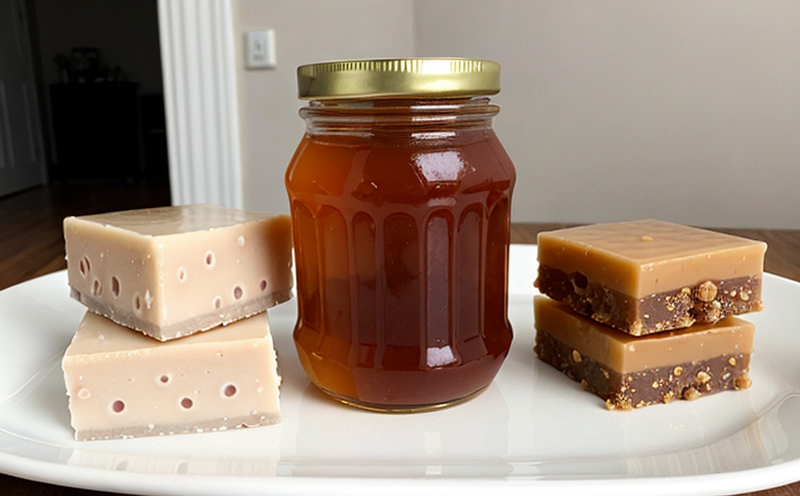USDA FSIS Authenticity Verification in Honey Imports
The U.S. Department of Agriculture's Food Safety and Inspection Service (FSIS) plays a critical role in ensuring the safety, quality, and authenticity of food products entering the United States. One of its key responsibilities is verifying the authenticity of honey imports to prevent adulteration or substitution with non-honey substitutes. This service ensures that imported honey meets all statutory requirements under 21 CFR Part 131, which governs the standards for honey.
The process of authenticating honey involves a series of tests designed to identify and verify the true nature of the product. Key aspects include:
- Botanical origin testing: Determines whether the honey is derived from genuine floral sources or has been adulterated with non-floral sugars.
- Microbiological analysis: Ensures that imported honey complies with microbial limits set by FSIS to protect public health.
- Chemical and physical analysis: Identifies potential contaminants such as artificial sweeteners, water, or other substances not typically found in natural honey.
The service provided by Eurolab is designed to meet these stringent requirements. Our team of experts uses state-of-the-art analytical methods and equipment to ensure accurate and reliable results. This includes Liquid Chromatography-Mass Spectrometry (LC-MS), which can detect trace amounts of adulterants, and Fourier Transform Infrared Spectroscopy (FTIR), used for rapid identification of honey components.
In addition to these technical capabilities, we also provide comprehensive documentation and reporting tailored to the needs of our clients. Our reports are designed to meet all regulatory requirements and can be easily integrated into your compliance framework. By partnering with Eurolab for USDA FSIS authenticity verification in honey imports, you ensure that your products remain compliant with U.S. standards, thereby protecting both consumer health and market integrity.
The importance of this service cannot be overstated. The global trade in honey is vast, but it also presents opportunities for fraudulent practices like adulteration or substitution. Ensuring the authenticity of imported honey not only maintains food safety but also upholds consumer trust in the U.S. market. By leveraging Eurolab's expertise and advanced testing methods, you can rest assured that your supply chain remains transparent and compliant.
Applied Standards
The United States relies on a variety of international standards to ensure the authenticity and quality of imported honey. These include:
- ISO 14957:2013: This standard provides guidance for chemical analysis in determining whether honey has been adulterated.
- ASTM E1648-15: Covers the determination of glucose and fructose in honey, which is crucial for verifying its purity.
- IUPAC Recommendations: Used for analytical methods that ensure accurate measurement of honey components.
These standards are integral to our testing process, ensuring that every batch of imported honey undergoes rigorous examination. Our compliance with these international norms reflects our commitment to providing reliable and scientifically sound results.
Eurolab Advantages
At Eurolab, we pride ourselves on offering unparalleled expertise in honey authenticity verification. Our team of scientists is equipped with the latest technology and methodologies to ensure accurate testing every time.
- State-of-the-Art Equipment: We utilize cutting-edge instruments such as LC-MS, FTIR, and GC-MS for precise analysis.
- Comprehensive Reporting: Our reports are detailed and easy to interpret, providing clear insights into the authenticity of your honey.
- Dedicated Team: Our experts have extensive experience in food safety and quality assurance, ensuring that your products meet all regulatory requirements.
Beyond our technical capabilities, Eurolab offers a range of additional services to support your compliance efforts. These include:
- Customized training programs for your staff.
- Consultation on best practices for honey sourcing and handling.
- Integration with existing quality management systems (QMS).
Partnering with Eurolab means more than just receiving test results; it means gaining access to a wealth of knowledge and resources designed to help you maintain the highest standards in your operations.
Environmental and Sustainability Contributions
- Reducing Waste: By ensuring that only authentic honey enters the market, we minimize waste associated with substandard or adulterated products.
- Promoting Sustainable Practices: Authentic honey production supports sustainable agricultural practices by encouraging the maintenance of natural habitats for bees and pollinators.
- Consumer Trust: Reliable testing enhances consumer confidence, which is vital for the long-term success of the honey industry.
In addition to these direct benefits, our service contributes indirectly by fostering a market environment that rewards ethical and sustainable practices. This helps drive positive changes in the honey supply chain, ultimately benefiting both producers and consumers globally.





